Look, I get it. You’re probably here because you just got that Serpstat renewal notice and you’re wondering if there’s something better out there. Trust me, I’ve been there – staring at that invoice while questioning whether I’m really getting my money’s worth from my SEO stack.
I’ve spent way too many late nights testing these tools (my wife wasn’t thrilled), but here’s what I actually found. Most people I talk to are looking for Serpstat alternatives because, honestly, it’s gotten expensive and doesn’t always deliver what they need.
Table of Contents
- TL;DR: Quick Decision Guide
- What Actually Matters When Choosing
- The Marketing Agency
- Ahrefs
- Semrush
- Mangools (KWFinder)
- SE Ranking
- Moz Pro
- Zutrix
- SpyFu
- SEO PowerSuite
- Wincher
- GrowthBar
- Notable Mentions
- FAQ
- Final Thoughts
TL;DR: Quick Decision Guide
Don’t have time to read this whole thing? Here’s my rapid-fire breakdown based on what you actually need:
Best Bang for Your Buck: Mangools – seriously, this is what I recommend to my friends who are just getting started ($19/month)
If Money’s No Object: Ahrefs has the best backlink data, period (starts at $129/month, but worth it)
The Kitchen Sink: Semrush does everything – SEO, PPC, social media, you name it ($139.95/month)
Full-Service Option: The Marketing Agency – we actually do the SEO work for you ($1,500-$15,000/month)
Broke But Need Results: Zutrix gets the job done without breaking the bank
Just Want Simple Rank Tracking: Wincher makes it dead simple ($49/month)
Content Creator’s Dream: GrowthBar combines SEO research with AI writing help ($36/month)
Data Hoarder Special: SEO PowerSuite – unlimited everything, but it’s desktop-only ($299/year)
Spy on Your Competitors: SpyFu shows you exactly what your competitors are doing ($39/month)
Comparison Table
| Tool | Best For | Starting Price | The Good Stuff | The Not-So-Good |
|---|---|---|---|---|
| The Marketing Agency | Full-service SEO | $1,500/month | We do it for you | Costs more than DIY |
| Mangools | Small businesses | $19/month | Super easy to use | Missing fancy features |
| Ahrefs | Backlink research | $129/month | Best backlink data | Expensive as hell |
| Semrush | Everything marketing | $139.95/month | Has everything | Can be overwhelming |
| SE Ranking | Flexible tracking | $55/month | Pay for what you use | Smaller database |
| Moz Pro | Learning SEO | $99/month | Great for beginners | Limited data |
| Zutrix | Budget users | Varies | Won’t break the bank | Newer, smaller database |
| SpyFu | Competitor spying | $39/month | See competitor history | Basic for your own site |
| SEO PowerSuite | Power users | $299/year | Unlimited data | Looks like 2010 |
| Wincher | Just rank tracking | $49/month | Simple and focused | That’s all it does |
| GrowthBar | Content creators | $36/month | AI + SEO research | Basic SEO features |
What Actually Matters When Choosing
When I’m helping someone pick a Serpstat replacement, I always tell them to think about five things:
Your Budget – And I mean your real budget, not just the sticker price. Factor in annual discounts, what happens when you need to add team members, and those sneaky extra charges for API access.
What You Actually Need – Do you spend all day doing keyword research? Need bulletproof backlink data? Just want to track rankings without the headache? Don’t pay for features you’ll never use.
How Tech-Savvy You Are – Some tools have a learning curve that’ll make you want to throw your laptop out the window. Others you can figure out in ten minutes. Be honest about your patience level.
Data Quality – Garbage in, garbage out. The tool with the biggest database isn’t always the best if the data is stale or inaccurate. Geographic coverage matters too if you’re not just targeting the US.
Playing Nice with Other Tools – Your SEO tool needs to work with Google Analytics, Search Console, and whatever else you’re using. Export capabilities matter if you need to create reports for clients or bosses.
The Marketing Agency
Full Disclosure: This Is Us, But Here’s Why It’s Worth Mentioning
Look, full disclosure – this is our agency. But here’s why I think it’s worth mentioning alongside these tools: we basically take whatever tool you choose and actually use it to grow your business. No more staring at dashboards wondering what to do next.
We don’t just give you access to data – we figure out what it means, make a plan, and actually execute it. Think of it as the difference between buying a gym membership and hiring a personal trainer who shows up at your house.
What We Actually Do
Our SEO services run $1,500 to $15,000 monthly, depending on how competitive your market is and how aggressive you want to be. We handle the technical stuff, figure out what keywords to target, optimize your content, and build links that actually move the needle.
Technical SEO – We fix the stuff that’s broken on your website. Page speed, crawl errors, site structure – all the boring but important things that make Google happy.
Content Strategy – We don’t just tell you to “create quality content.” We figure out exactly what content your audience wants and what Google rewards, then make sure it gets created and optimized.
Local SEO – If you’re a local business, we make sure people can find you when they’re searching in your area. Citations, Google My Business, location pages – the whole nine yards.
Link Building – We get other websites to link to yours, but we do it the right way. No sketchy tactics that’ll get you penalized.
The Good Stuff
You Don’t Have to Become an SEO Expert – We handle the strategy and execution while you focus on running your business. No more trying to figure out what all those metrics mean.
Everything Works Together – Instead of using five different tactics that might conflict with each other, we make sure your technical SEO, content, and link building all support the same goals.
It Scales with You – As your business grows, we adjust the strategy. No need to learn new tools or hire new people.
Clear Reporting – You’ll know exactly what we’re doing and how it’s affecting your bottom line. No vanity metrics or confusing jargon.
Continuous Optimization – SEO isn’t a one-and-done thing. We keep tweaking and improving based on what’s working and what’s not.
The Real Talk
It Costs More Than DIY – Obviously, paying someone to do the work costs more than buying a tool and doing it yourself. But most businesses see better ROI because the work actually gets done right.
Less Control – If you’re the type who wants to be hands-on with every detail, this might not be for you. We focus on results, not giving you access to every tool and dashboard.
How We Stack Up
Budget-Friendliness: 3/5 – Higher upfront cost but usually better ROI
Feature Completeness: 5/5 – We handle everything SEO-related
User Experience: 5/5 – You get results without having to learn complex tools
Data Accuracy: 5/5 – We use multiple data sources and know how to interpret them
Integration: 5/5 – Works seamlessly with your existing business systems
What People Say
Clients consistently tell us they wish they’d found us sooner instead of struggling with DIY SEO or working with agencies that just sent monthly reports without moving the needle. The businesses that work with us usually see significant traffic and revenue increases because we focus on what actually matters for their bottom line.
Getting Started
SEO services start at $1,500/month for smaller businesses and scale up to $15,000/month for enterprise-level stuff. We always start with a deep dive into your business goals and competitive landscape before recommending a strategy.
If you want someone to just handle all this SEO stuff for you, give us a shout. Otherwise, pick one of these tools and start testing.
Ahrefs
The Backlink King (But It’ll Cost You)
I remember when I first tried Ahrefs and nearly choked on my coffee when I saw the price. But here’s the thing – if you need serious backlink data, nothing else comes close. They crawl a ridiculous amount of pages every day (we’re talking 8 billion), which is why their backlink data is so good.
And it’s not just backlinks – they’ve got keyword data for pretty much everywhere. 10 billion keywords across 243 countries. Yeah, it’s a lot.
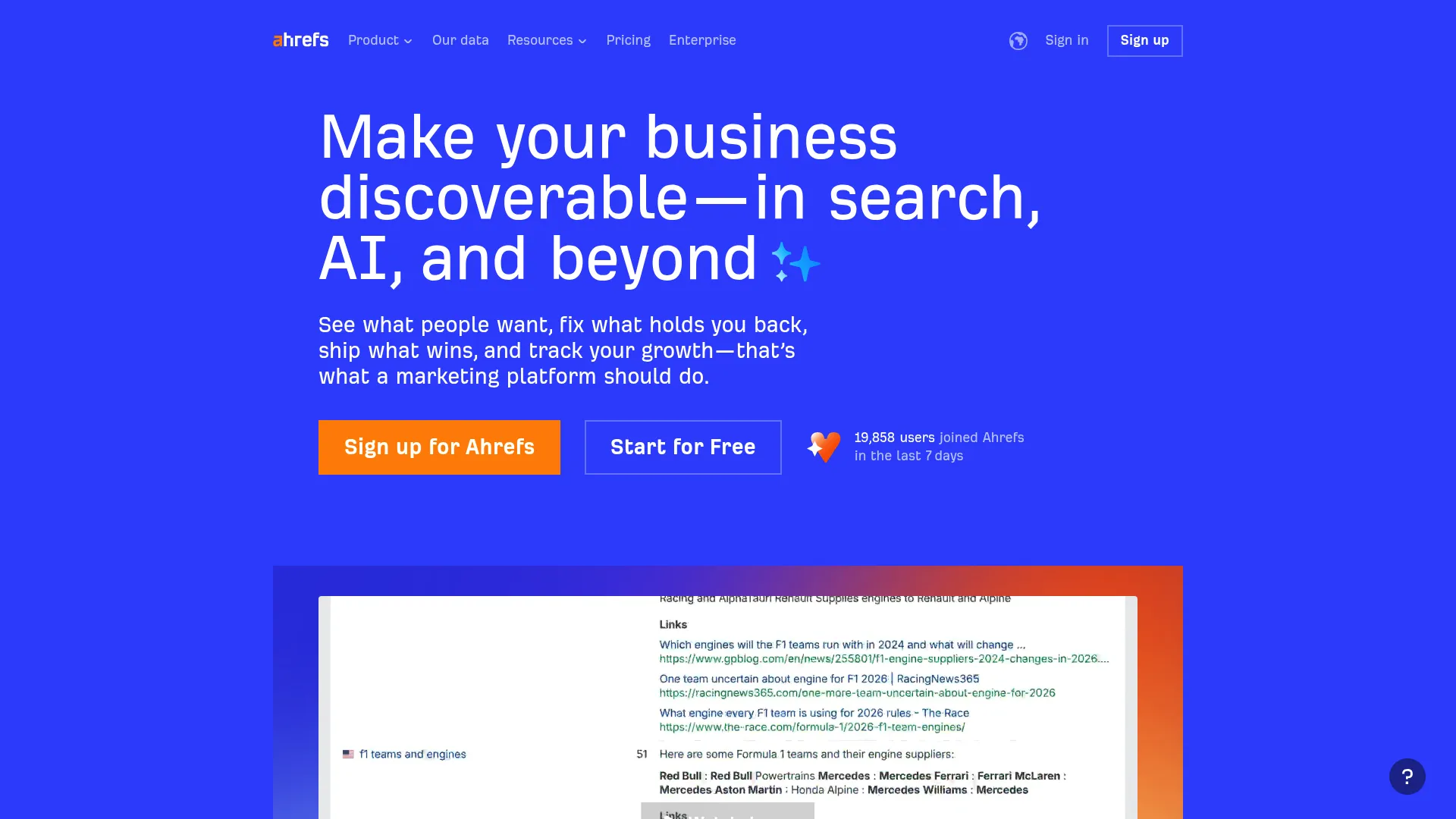
What Makes Ahrefs Special
Site Explorer is where the magic happens. You can see every backlink pointing to any website, plus all the juicy details like domain rating and link quality. It updates every 15 minutes, so you’re getting fresh data.
Keywords Explorer goes way beyond basic search volume. It tells you how hard it’ll be to rank (and it’s scary accurate), what percentage of clicks actually go to the top results, and even suggests broader topics you might miss.
Content Explorer is like having a crystal ball for content ideas. Find the most popular content in any niche, see what’s getting shared, and spot content gaps your competitors haven’t filled yet.
Rank Tracker does what it says on the tin, but it also tracks all those fancy SERP features like featured snippets and local packs. Plus it’ll alert you when something big changes.
Site Audit crawls your website and tells you everything that’s broken. It checks over 100 different SEO factors and actually tells you which ones matter most.
The Good Stuff
Their backlink database updates every 15 minutes, which is insane. When I’m doing competitor research, I can literally see new links as they happen.
The keyword difficulty scores are scary accurate. I’ve stopped wasting time on impossible keywords because Ahrefs told me they were too competitive.
The interface just makes sense. Even with all these features, I can find what I need without getting lost in menus.
Their support team actually knows what they’re talking about, which is refreshing. Plus their blog and YouTube channel are goldmines for learning SEO.
The Not-So-Good
It’s expensive. Really expensive. The cheapest real plan is $129/month, and if you need the good stuff, you’re looking at way more. There’s a $29 plan, but it’s basically useless.
The learning curve can be brutal if you’re new to SEO. There’s so much data available that beginners often don’t know where to start.
PPC analysis is pretty basic compared to dedicated advertising tools. Don’t expect Semrush-level ad insights.
No white-label reports, which sucks if you’re an agency trying to impress clients.
How It Measures Up
Budget-Friendliness: 2/5 – Great tool, terrible for your wallet
Feature Completeness: 5/5 – Has everything you need for serious SEO
User Experience: 4/5 – Well-designed but can be overwhelming
Data Accuracy: 5/5 – The gold standard for backlink data
Integration: 4/5 – Good API and connects to the important stuff
What Users Actually Say
SEO pros consistently say Ahrefs is essential for serious link building. The data quality justifies the price if you’re doing client work or managing big sites. Agency owners note that while it’s expensive, clients don’t question the investment when they see the results.
Source: Aggregated user reviews from G2, Capterra, and industry forums
The Bottom Line
Plans start at $129/month for Lite, going up to $1,499/month for Enterprise. Pro tip: pay annually and you get two months free. Still expensive, but every bit helps.
Check out current pricing at Ahrefs.com.
Semrush
The Swiss Army Knife of Digital Marketing
Semrush is like that friend who’s good at everything – maybe not the absolute best at any one thing, but solid across the board. They’ve got over 10 million users worldwide, which tells you something. The tool started as keyword research but now does SEO, PPC, social media, content marketing, and probably your taxes if you ask nicely.
They’ve got 25+ billion keywords across 142 countries, so unless you’re targeting some really obscure market, they’ve got you covered.
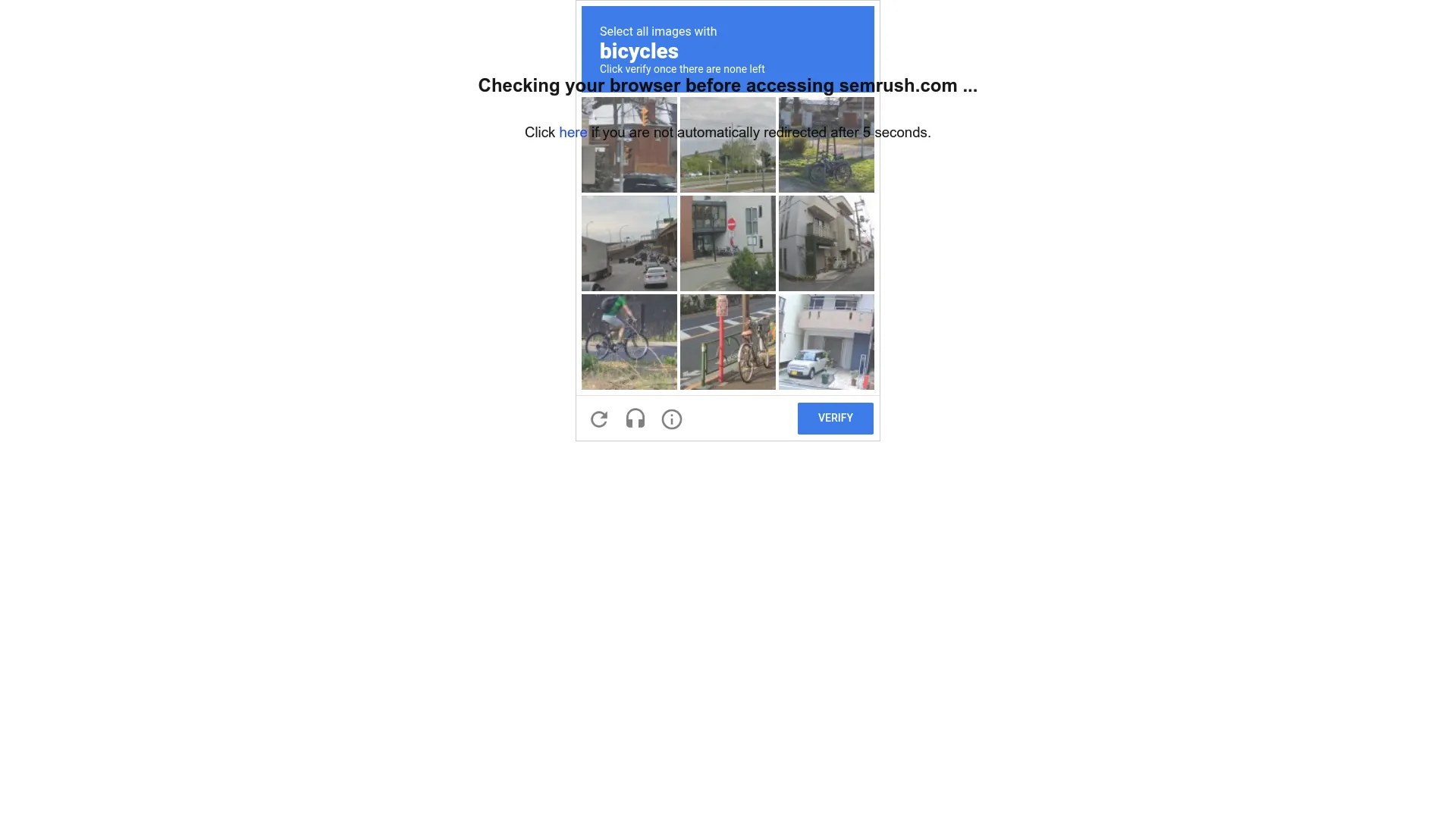
What Semrush Does Well
Keyword Magic Tool is their crown jewel. It doesn’t just give you keyword ideas – it organizes them into logical groups and tells you what people are actually trying to do when they search. Want question-based keywords? Content gaps? It’s all there.
Domain Analytics is like having X-ray vision for your competitors. See their organic and paid strategies, top content, backlinks, and get alerts when they change something important.
Site Audit checks over 130 different SEO issues and actually tells you which ones to fix first. It connects to Google Analytics too, so you get the full picture.
Position Tracking monitors your rankings across devices, locations, and search engines. Daily updates, SERP feature tracking, and you can see what your competitors are doing.
Content Gap Analysis shows you keywords your competitors rank for that you don’t. It’s like finding money on the sidewalk.
The Good Stuff
It does everything, which means you might not need other tools. Could save money in the long run if you use multiple features.
The PPC analysis is actually good – not just an afterthought. You can see competitor ad copy, budget estimates, and ad performance. Super useful if you’re running both SEO and paid campaigns.
Content marketing tools help you create stuff that actually performs. The SEO Writing Assistant is like having an editor who knows SEO.
Social media management is built in, so you can see what content works across all channels.
Their training resources are excellent. Semrush Academy offers certifications that actually mean something.
The Not-So-Good
It can be overwhelming. There are so many features and menus that new users often get lost. I’ve seen people pay for it and only use 10% of the features.
The pricing gets expensive fast, especially when you need advanced features or want to add team members. The Pro plan is pretty limited.
The backlink database isn’t as comprehensive as Ahrefs. You might miss some link opportunities.
Some advanced features require higher-tier plans, which can be frustrating when you discover limitations after signing up.
How It Stacks Up
Budget-Friendliness: 2/5 – Premium pricing with feature restrictions on lower tiers
Feature Completeness: 5/5 – Does everything marketing-related
User Experience: 4/5 – Feature-rich but can be overwhelming
Data Accuracy: 4/5 – Reliable data across most features
Integration: 5/5 – Connects to everything and has great API access
Real User Feedback
Digital marketing agencies love it because one tool can handle multiple client needs. PPC managers particularly praise the advertising intelligence – being able to see competitor ad history often reveals profitable opportunities. Content marketers love the writing assistant and topic research tools.
Source: Aggregated reviews from software comparison sites and marketing forums
Pricing Reality Check
Plans start at $139.95/month for Pro, jumping to $499.95/month for Business. Enterprise pricing is custom (translation: expensive). Annual billing saves you some money – up to 17% on some plans.
You can try it free first at Semrush.com.
Mangools (KWFinder)
The Tool That Actually Makes Sense
Here’s what I love about Mangools – they figured out that most people don’t need 47 different features. They built five tools that work together perfectly and made them so easy to use that you can figure them out over lunch. No PhD in SEO required.
KWFinder is their star player, and it’s brilliant at finding those long-tail keywords that bigger tools miss. You know, the ones that actually convert because they’re super specific.

What Makes It Click
KWFinder is magic for long-tail keyword discovery. It suggests related keywords while you type and shows you exactly how hard they’ll be to rank for. The difficulty scores are realistic, not scary like some tools.
SERPChecker analyzes the competition for any keyword. You can see domain authority, page authority, and social signals for every result. Helps you figure out if you actually have a shot at ranking.
SERPWatcher tracks your rankings with beautiful charts that make sense. No confusing dashboards – just clear visuals showing if you’re going up or down.
LinkMiner finds backlink opportunities and shows you the good stuff. Plus it gives you contact info for outreach, which saves hours of detective work.
SiteProfiler gives you a complete overview of any website – SEO metrics, social presence, traffic estimates. It’s like a background check for domains.
Why People Love It
The interface is so clean and intuitive that beginners don’t feel stupid using it. Everything is visual and makes sense without needing a manual.
It won’t break the bank. Finally, an SEO tool that doesn’t cost more than your car payment.
The long-tail keyword discovery is fantastic. While everyone else fights over “insurance,” you’re ranking for “cheap car insurance for college students in Ohio.”
Customer support actually helps instead of just sending you to the knowledge base. They get that many users are still learning SEO.
It focuses on actionable data instead of drowning you in metrics you’ll never use.
The Limitations
It doesn’t have all the advanced features that enterprise tools offer. If you need complex analysis, you might outgrow it.
The keyword database is solid but not massive. In super competitive niches, you might hit some walls.
Site audit is pretty basic. For complex technical issues, you’ll need something more robust.
Limited API access compared to the big players. Not great if you need heavy automation.
The Scorecard
Budget-Friendliness: 4/5 – Great value without the premium price tag
Feature Completeness: 3/5 – Covers the essentials but not everything
User Experience: 5/5 – Best-in-class interface design
Data Accuracy: 4/5 – Reliable data with regular updates
Integration: 3/5 – Basic connections, room for improvement
What Users Say
Small business owners consistently say Mangools made SEO finally make sense. The learning curve is practically nonexistent. SEO consultants recommend it to clients who need results without complexity. Beginners love that it teaches you SEO concepts while you use it.
Source: User reviews from software directories and SEO communities
Pricing That Makes Sense
Plans start at $19/month for Entry, going up to $129/month for Agency. Pay annually and save big. The Entry plan gives you all five tools with limits that work for most small businesses.
Check it out at Mangools.com.
SE Ranking
The Flexible Option That Adapts to Your Budget
SE Ranking does something smart that others don’t – they let you choose how often you want your data updated. Want daily updates? Pay more. Weekly is fine? Pay less. It’s like choosing your own adventure for SEO tools.
They serve over 500,000 users globally, with particular strength in markets where every dollar counts. The rank tracking covers 100+ search engines with whatever frequency you can afford.
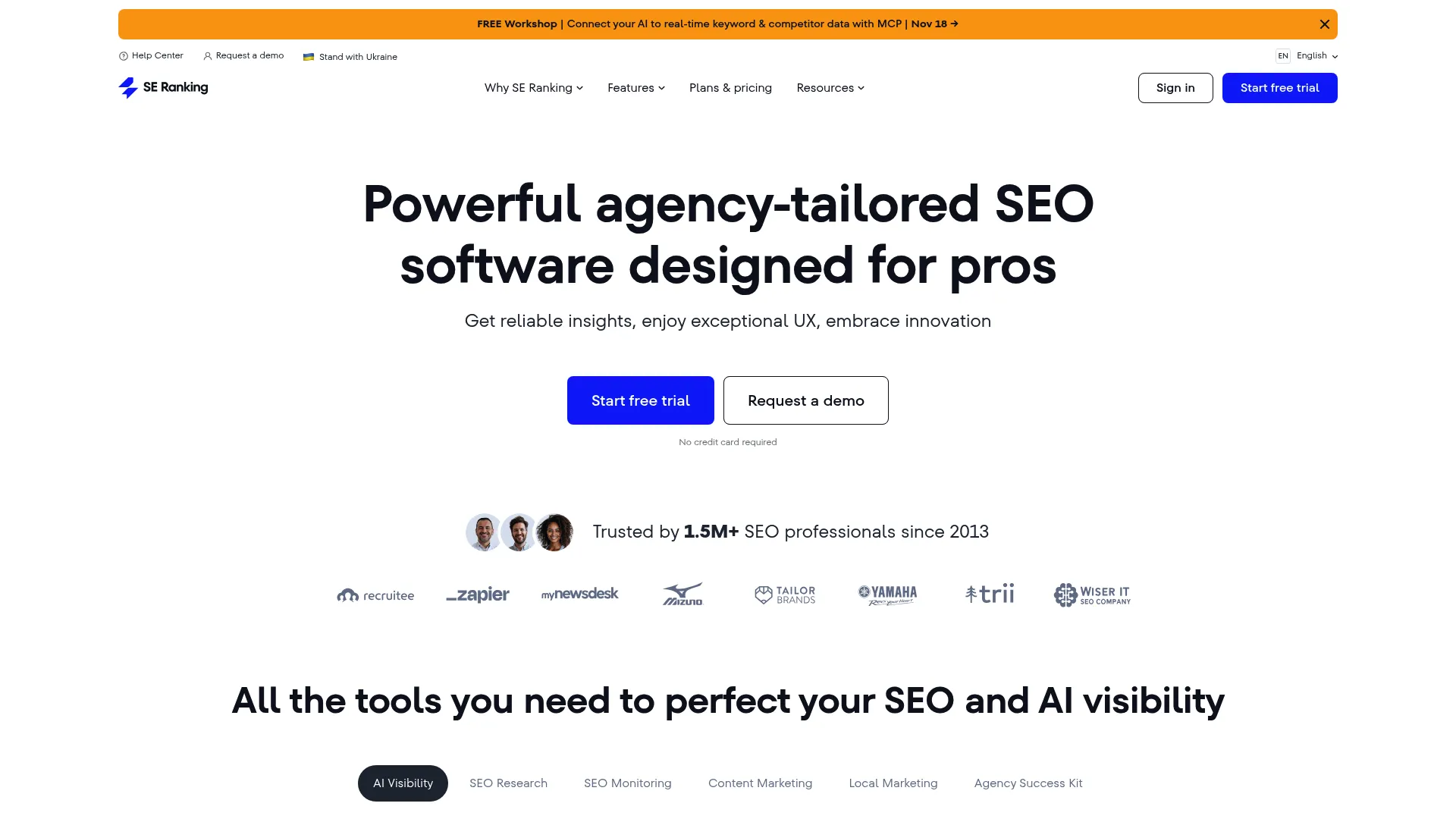
What Sets It Apart
Rank Tracking is super flexible – you pick the update frequency based on your budget and needs. It tracks local packs, featured snippets, and all the SERP features across multiple devices and locations.
Website Audit examines technical SEO with prioritized recommendations. It finds crawl errors, duplicate content, broken links, and page speed issues, then tells you what to fix first.
Keyword Research includes search volume, competition analysis, and related suggestions. It groups keywords by topic and provides realistic difficulty scores.
Competitor Analysis shows organic and paid strategies, keyword overlaps, content gaps, and backlink opportunities. You can track competitor changes over time.
Backlink Monitoring tracks your link profile and identifies potentially harmful links. It even generates disavow files and monitors competitor link building.
The Good Stuff
The pricing flexibility is genius. You can optimize costs based on how intense your campaigns are without losing essential features.
White-label reporting is excellent for agencies. Custom branding, automated delivery, and professional templates that actually look good.
Local SEO features include local pack tracking, Google My Business monitoring, and citation management. Great for businesses targeting geographic markets.
The interface balances functionality with usability. It’s professional without being overwhelming.
Customer support is responsive with multilingual options. They understand the platform’s flexibility and help optimize settings.
The Downsides
The backlink database isn’t as comprehensive as specialized tools. You might miss some competitive intelligence and link opportunities.
Content optimization is pretty basic compared to dedicated content platforms. Advanced content analysis needs other tools.
The interface looks a bit dated compared to newer competitors. Functional but not as sleek.
API limitations on lower plans restrict automation. Advanced workflows require higher-tier subscriptions.
The Report Card
Budget-Friendliness: 4/5 – Flexible pricing with solid value
Feature Completeness: 4/5 – Comprehensive toolkit with strong core features
User Experience: 4/5 – Functional but could use a visual refresh
Data Accuracy: 4/5 – Reliable with customizable update frequencies
Integration: 3/5 – Basic integrations with API limits on lower plans
User Experiences
Digital marketing agencies love the white-label reporting and flexible pricing. Being able to adjust tracking frequency based on client needs gets consistent praise. Small businesses appreciate the local SEO features and affordable entry point. SEO professionals note that while it doesn’t excel in any single area, the overall package provides solid value.
Source: Agency reviews and SEO community discussions
What It Costs
Plans start at $55/month for Essential, going up to $239/month for Business. Pricing varies based on your chosen tracking frequency. Annual subscriptions provide additional savings. Enterprise solutions available for larger organizations.
See current pricing at SE Ranking.com.
Moz Pro
The Teacher’s Pet of SEO Tools
Moz is like that professor everyone loved – they don’t just give you answers, they explain why. They invented Domain Authority, which every SEO person references daily. Their blog, Whiteboard Friday videos, and guides taught half the SEO industry what they know.
The platform focuses on giving you reliable, well-explained insights rather than overwhelming you with data. Perfect for businesses that want to actually understand SEO while they’re doing it.
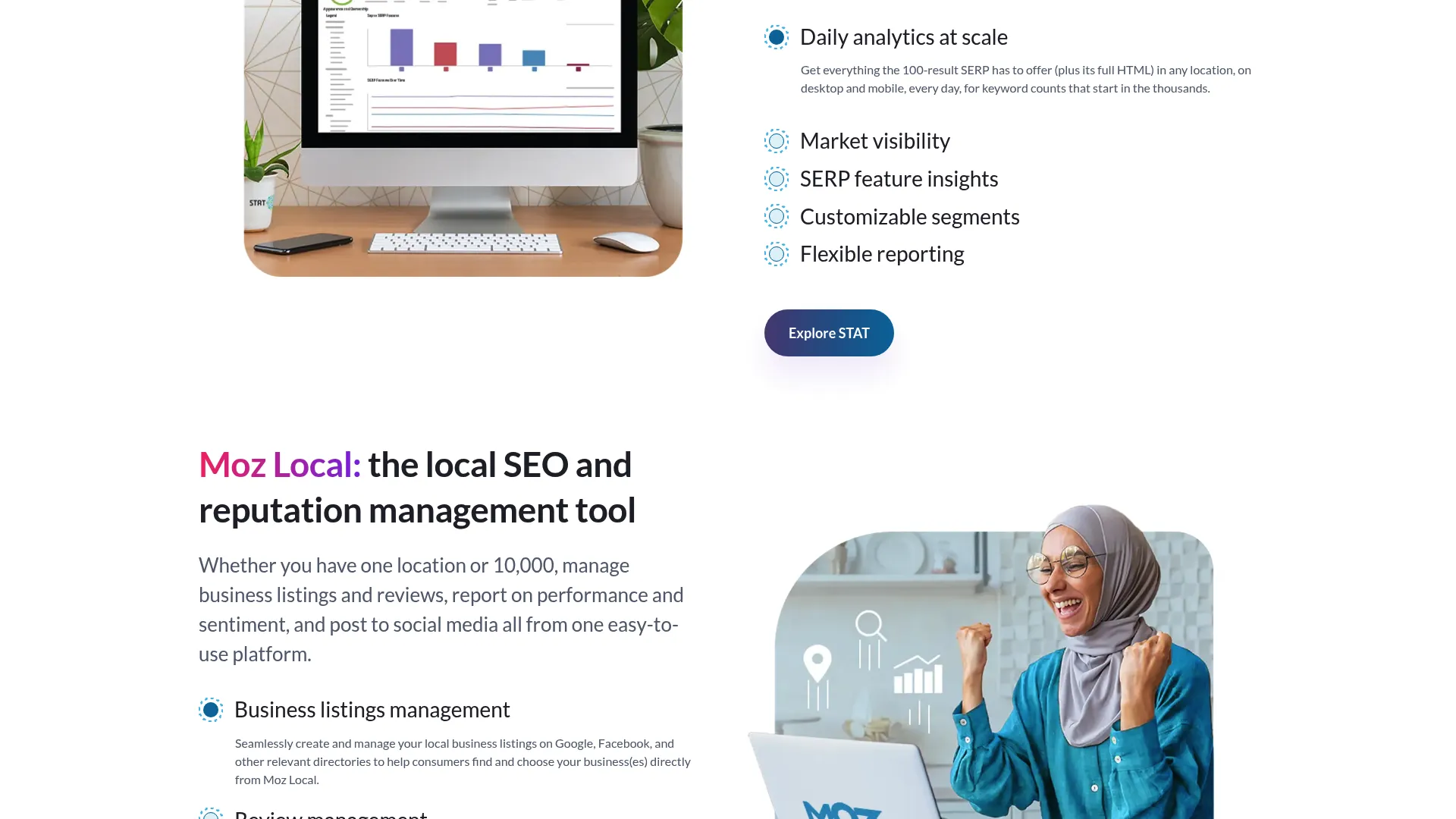
What Moz Does Right
Keyword Explorer gives you search volume and difficulty scores with clear explanations of what everything means. The priority score combines multiple factors to help you pick the best opportunities.
Link Explorer analyzes backlinks using Domain Authority and Page Authority. It finds link opportunities and provides spam scores to help you avoid toxic links.
Site Crawl examines technical SEO issues with detailed explanations and fix recommendations. It prioritizes issues by impact and explains why each one matters.
Rank Tracker monitors positions with SERP feature tracking and competitor comparisons. Historical data shows trends and helps identify opportunities.
On-Page Optimization analyzes individual pages and gives specific suggestions for titles, meta descriptions, content, and internal linking.
Why People Choose Moz
The educational resources are incredible. The Moz Blog, guides, and community forums teach you SEO strategy, not just tool features.
Domain Authority is the most recognized website authority metric in SEO. Makes communication with clients and partners much easier.
The interface prioritizes clarity over data density. New users can understand recommendations without an SEO degree.
Local SEO through Moz Local helps manage citations, reviews, and local search presence. Integrates nicely with Moz Pro.
Customer support is high quality with knowledgeable reps who actually understand SEO principles, not just the software.
The Challenges
The keyword database is smaller than competitors. You might hit limitations in competitive or niche markets.
Backlink data isn’t as fresh or comprehensive as specialized tools. Serious link building might need supplementary platforms.
Pricing gets expensive for advanced features. Higher-tier plans are necessary for full functionality.
Data updates are slower than some competitors, especially for rankings and backlinks. Time-sensitive decisions might need fresher data.
The Grades
Budget-Friendliness: 3/5 – Moderate pricing with educational value
Feature Completeness: 4/5 – Solid toolkit focused on core functionality
User Experience: 4/5 – Clear, educational interface
Data Accuracy: 4/5 – Reliable data with industry-standard metrics
Integration: 4/5 – Good connections plus local SEO integration
Community Feedback
SEO educators and consultants frequently recommend Moz for its teaching approach and reliable metrics. Beginners appreciate the explanatory style that builds understanding. Established SEO professionals value Domain Authority as a communication tool with clients and stakeholders.
Source: Educational SEO communities and consultant recommendations
The Investment
Plans start at $99/month for Starter, up to $599/month for Premium. Moz Local costs extra for comprehensive local SEO. Annual billing provides modest discounts.
Try it free at Moz.com.
Zutrix
The Scrappy Underdog That Won’t Break the Bank
Zutrix is what happens when someone gets fed up with $200/month SEO tools and decides to build something affordable that actually works. They focus on real-time data and clean interfaces, recognizing that smaller teams need efficiency more than 47 different features.
It’s newer than the big players, but sometimes that’s good – they’re not carrying around legacy baggage and outdated interfaces.

What Zutrix Brings to the Table
Real-Time Rank Tracking gives you instant notifications when rankings change significantly. Monitor multiple search engines and locations with customizable alert thresholds.
Keyword Research includes search volume, competition analysis, and related suggestions. It focuses on opportunities rather than overwhelming you with data.
Backlink Monitoring tracks link profile changes and finds new opportunities. The database isn’t massive, but it covers essential monitoring needs.
Competitor Analysis reveals organic strategies, keyword overlaps, and content opportunities. Historical tracking shows performance trends and strategic changes.
White-Label Reporting lets agencies present professional client reports with custom branding. Templates are customizable with automated delivery.
The Good News
Finally, an SEO tool that doesn’t cost more than your rent. Professional features at prices that make sense for small businesses.
The interface is clean and efficient. You can get stuff done without navigating maze-like menus or overwhelming dashboards.
Real-time ranking notifications mean you know immediately when something big happens. Great for quick reactions to algorithm updates or competitor moves.
Shareable project links let team members and clients access data without needing their own accounts. No subscription overhead for collaboration.
Customer support maintains quality despite the budget-friendly pricing. They don’t cheap out on helping users.
The Reality Check
Database size limitations might affect research in super competitive markets. Coverage doesn’t match the comprehensiveness of premium alternatives.
Advanced features from enterprise tools aren’t included. You might outgrow it as your SEO needs get more sophisticated.
It’s newer, so it lacks the track record of established competitors. Less market validation and smaller user base.
Site audit is basic and might miss complex technical issues that specialized tools would catch.
The Score
Budget-Friendliness: 5/5 – Exceptional value at accessible pricing
Feature Completeness: 3/5 – Essential features but lacks advanced capabilities
User Experience: 4/5 – Clean, efficient design
Data Accuracy: 3/5 – Reliable for basic needs but limited database
Integration: 3/5 – Basic integrations with room for growth
What Users Think
Small business owners love that SEO tools are finally accessible without major budget allocation. Freelance consultants appreciate white-label reporting at affordable prices. Users consistently say that while it’s not comprehensive, it covers most daily SEO needs effectively.
Source: Small business forums and budget-conscious SEO communities
The Price Tag
Three pricing tiers with significant annual discounts. Specific pricing varies based on features and usage levels. Annual subscriptions provide substantial savings.
Check current pricing at Zutrix.com.
SpyFu
The Nosy Neighbor of SEO Tools
SpyFu basically turns you into that friend who knows a little too much about everyone’s business. Instead of trying to do everything, they focus intensively on competitive intelligence. Their database goes back 15+ years, so you can see how competitor strategies evolved and which tactics actually worked.
It’s perfect for answering “What are my competitors doing that I’m not?” across both organic and paid search.

Where SpyFu Shines
Competitor Keyword Research shows every keyword your competitors rank for, plus their estimated traffic and ranking history. You can see which keywords drive the most traffic and identify gaps in your strategy.
PPC Competitor Analysis provides comprehensive insights into advertising strategies, including ad copy variations, budget estimates, and bidding patterns. Historical ad data reveals seasonal trends and successful campaign elements.
Domain Comparison allows side-by-side analysis of multiple competitors, showing market share distribution and competitive positioning. Identifies which competitors pose the greatest threats and opportunities.
Keyword Grouping organizes related keywords into logical clusters, revealing content themes and PPC campaign structures that competitors use successfully.
Custom Reporting combines competitor insights with your own performance data. Reports can be automated and branded for clients or stakeholders.
The Cool Stuff
Historical data depth provides context that current-moment analysis can’t match. Understanding how strategies evolved helps predict future moves and identify proven tactics.
PPC analysis rivals dedicated advertising intelligence tools while staying affordable. Having SEO and PPC insights in one platform streamlines competitive research.
The interface prioritizes actionable insights over raw data. You can quickly spot opportunities without getting lost in excessive detail.
Pricing stays accessible compared to comprehensive platforms while providing specialized competitive intelligence that justifies the investment.
Customer support understands competitive research workflows and provides strategic guidance beyond technical help.
The Limitations
Own-site optimization tools are limited. SpyFu excels at competitive analysis but provides minimal functionality for optimizing your own website.
The feature set focuses narrowly on competitive intelligence. This specialization creates value but also means you’ll need other tools for comprehensive SEO.
Site audit capabilities are basic compared to dedicated auditing tools. Complex technical optimization requires supplementary platforms.
International data coverage has gaps compared to global SEO platforms. Non-US competitive analysis may lack depth and accuracy.
The Verdict
Budget-Friendliness: 4/5 – Affordable for specialized competitive intelligence
Feature Completeness: 3/5 – Excellent competitor analysis but limited own-site tools
User Experience: 4/5 – Clear interface focused on actionable insights
Data Accuracy: 4/5 – Reliable competitive data with extensive historical coverage
Integration: 3/5 – Basic integrations focused on data export
User Experiences
Competitive intelligence specialists consistently recommend SpyFu for historical data depth and PPC analysis. Small agencies appreciate affordable access to competitor insights that would otherwise require expensive enterprise tools. Marketing strategists value the historical perspective for identifying long-term trends.
Source: Competitive analysis communities and PPC specialist forums
What It Costs
Plans start at $39/month for Basic, up to $299/month for Professional. Annual billing provides standard discounts. Higher tiers include additional competitor tracking and advanced reporting.
Explore competitive intelligence at SpyFu.com.
SEO PowerSuite
The Desktop Dinosaur That Actually Works
SEO PowerSuite feels like it was designed in 2010, but hey, it gets the job done. Instead of cloud-based tools, they give you desktop applications that can process unlimited data without monthly restrictions. It’s like having a beast of a computer dedicated to SEO analysis.
Their desktop approach means more intensive data processing than web tools typically allow. You can crawl massive websites, process huge keyword lists, and do detailed competitor analysis without hitting limits.
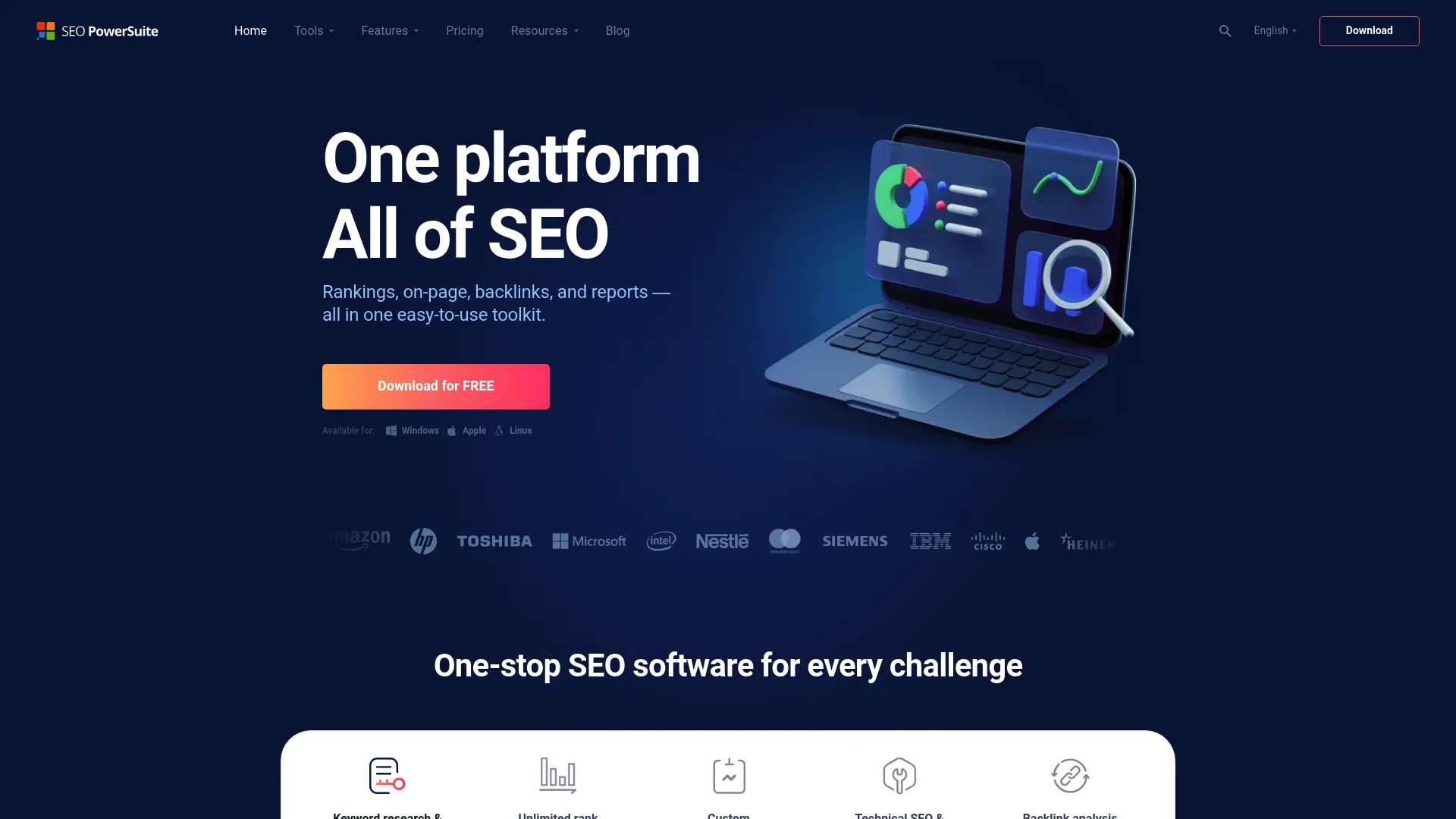
What You Get with SEO PowerSuite
Rank Tracker monitors positions across 597 search engines with unlimited keyword tracking. Detailed SERP analysis, competitor comparison, and ranking distribution reports without monthly limits.
WebSite Auditor performs comprehensive technical SEO analysis with unlimited page crawling. Examines on-page factors, technical issues, and provides detailed improvement recommendations.
SEO SpyGlass analyzes backlink profiles with unlimited link processing. Identifies link building opportunities, assesses link quality, and provides comprehensive competitor backlink analysis.
LinkAssistant manages link building campaigns with contact management, outreach automation, and relationship tracking. Streamlines the entire process from prospect identification to relationship management.
Why People Choose Desktop
Unlimited data processing eliminates those annoying monthly restrictions. Analyze huge websites, massive keyword lists, and comprehensive competitor data without hitting caps.
Data accuracy benefits from direct search engine queries rather than cached results. More current and precise information for critical SEO decisions.
One-time purchase options eliminate ongoing subscription costs. Appeals to organizations preferring capital expenditures over operational expenses.
Automation capabilities enable complex, multi-step workflows that run independently of internet connectivity. Advanced users can create sophisticated analysis processes.
Privacy advantages keep sensitive data on local systems rather than cloud servers. Appeals to organizations with strict data security requirements.
The Downsides
Desktop installation limits accessibility compared to cloud tools. Team collaboration becomes more complex when tools aren’t web-accessible.
The interface looks seriously outdated compared to modern web applications. Might feel clunky to users accustomed to contemporary software design.
Learning curves are steep due to comprehensive feature sets and desktop complexity. New users often struggle with extensive functionality and navigation.
Real-time data updates aren’t available since tools don’t maintain live search engine connections. Data freshness depends on manual updates.
Cloud-based collaboration is limited, making team workflows more challenging than web-based platforms. Sharing requires manual processes rather than integrated sharing.
The Report Card
Budget-Friendliness: 4/5 – One-time purchase provides long-term value
Feature Completeness: 4/5 – Comprehensive toolset with unlimited processing
User Experience: 2/5 – Outdated interface with steep learning curve
Data Accuracy: 5/5 – Direct search engine queries provide high accuracy
Integration: 2/5 – Limited cloud integrations and collaboration features
User Feedback
Enterprise SEO professionals appreciate unlimited data processing and high accuracy levels. Technical SEO specialists value detailed analysis capabilities and automation options. Budget-conscious businesses like the one-time purchase option that eliminates ongoing subscriptions.
Source: Enterprise SEO forums and power user communities
Pricing Structure
Annual licenses start around $299/year for the complete suite, with individual tool purchases available. Professional and Enterprise versions include additional features and support. Custom licensing for larger organizations.
Check current pricing at SEO PowerSuite.com.
Wincher
The One-Trick Pony That Does It Really Well
Wincher deliberately keeps things simple – they do rank tracking and that’s it. No bells, no whistles, no features you’ll never use. Just clean, effective rank tracking that you can set up in about five minutes.
Sometimes focusing on one thing really well beats trying to do everything mediocrely.
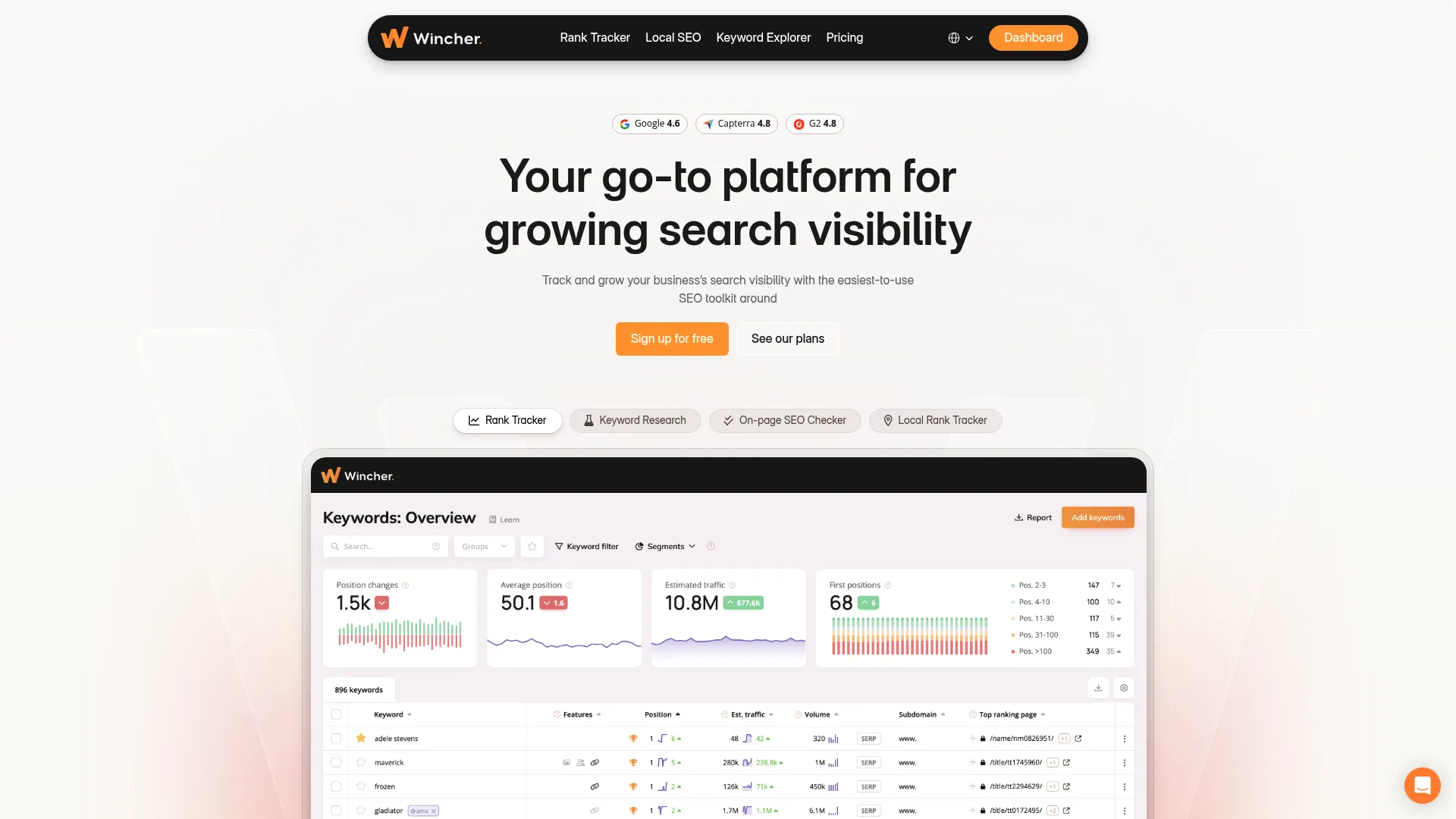
What Wincher Does
Keyword Rank Tracking monitors positions across multiple search engines and locations with daily updates. Clear visualization of ranking trends and significant position changes.
Competitor Monitoring tracks competitor keyword positions alongside your rankings. Reveals competitive gaps and improvement opportunities.
SERP Feature Tracking identifies when keywords trigger featured snippets, local packs, or other special search elements. Helps optimize content for enhanced visibility.
Basic Keyword Research provides search volume data and related keyword suggestions. Not comprehensive, but supports rank tracking strategy development.
Simple Reporting creates clean, focused reports highlighting ranking performance without overwhelming detail. Can be automated and shared with team members or clients.
Why It Works
Setup takes literally minutes without extensive configuration or learning curves. You can start tracking keywords immediately after account creation.
Interface clarity makes ranking data instantly understandable. Visual elements highlight important changes and trends effectively.
Pricing won’t break the bank for professional rank tracking capabilities. Great value for businesses with specific tracking needs.
Customer support maintains quality despite the focused feature set. Support addresses rank tracking optimization and strategic guidance.
Implementation is effortless across teams without extensive training. The simplicity reduces onboarding time and user resistance.
The Trade-offs
Feature limitations beyond rank tracking require additional tools for comprehensive SEO. The focused approach creates value but necessitates supplementary platforms.
No site audit capabilities means no technical SEO insights or optimization recommendations. Technical optimization needs separate tools.
Backlink analysis isn’t included, limiting competitive analysis and link building strategy development. Comprehensive competitor research needs additional platforms.
Content optimization features aren’t available, providing no guidance for improving page-level SEO performance.
The Scorecard
Budget-Friendliness: 4/5 – Affordable pricing for focused functionality
Feature Completeness: 2/5 – Excellent rank tracking but limited additional features
User Experience: 5/5 – Outstanding simplicity and ease of use
Data Accuracy: 4/5 – Reliable ranking data with regular updates
Integration: 3/5 – Basic integrations focused on rank tracking workflows
What Users Say
Small business owners love Wincher’s simplicity and focused functionality. SEO consultants recommend it for clients needing basic rank tracking without comprehensive platform overhead. Teams value quick implementation and minimal learning curves.
Source: Small business SEO communities and simplicity-focused user groups
The Price
Plans start at $49/month with higher tiers for increased keyword tracking limits. Pricing scales with tracking volume rather than feature complexity. Annual billing provides standard discounts.
Try rank tracking at Wincher.com.
GrowthBar
The Content Creator’s Best Friend
GrowthBar bridges the gap between SEO research and content creation by integrating AI with traditional SEO functionality. Their Chrome extension gives you instant SEO data while browsing, eliminating the need to switch between tools during research.
The AI goes beyond basic content generation to include SEO-optimized suggestions, competitor analysis integration, and content gap identification. Perfect for content marketers who need both research insights and creation assistance.
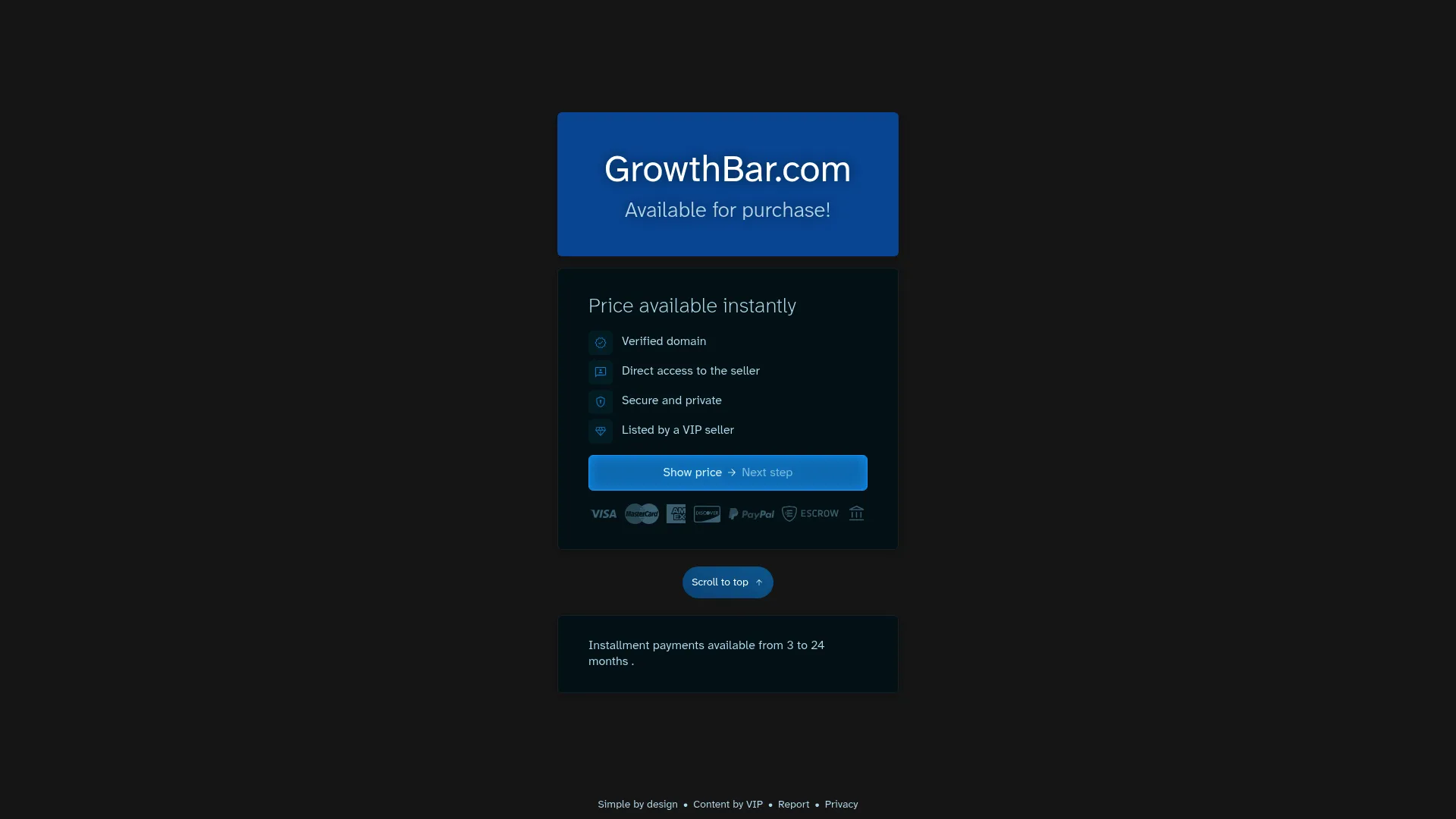
What Makes GrowthBar Different
Chrome Extension provides instant SEO data while browsing any website, including keyword difficulty, search volume, and backlink information. No more workflow interruptions during research.
AI Content Generation creates SEO-optimized blog posts, product descriptions, and marketing copy based on target keywords and competitive analysis. AI incorporates SEO best practices into content structure.
Keyword Research includes search volume data, competition analysis, and content gap identification. Connects keyword insights directly to content creation workflows.
Competitor Analysis reveals content strategies, top-performing pages, and keyword opportunities. Insights integrate with content creation features to guide strategic development.
SERP Analysis examines search results for target keywords, identifying content formats, lengths, and optimization patterns that perform well. Analysis informs AI content generation parameters.
The Good Stuff
Browser extension convenience provides instant SEO insights without leaving your workflow. Research and analysis become seamless parts of content development.
AI content creation saves time while incorporating SEO optimization principles. Generated content provides solid foundations requiring editing rather than complete creation from scratch.
Pricing makes AI-powered content creation accessible to smaller businesses and individual creators. No enterprise-level pricing for AI functionality.
Content marketing focus aligns features with creator needs rather than technical SEO requirements. Serves content marketers more effectively than general-purpose platforms.
Quick implementation allows immediate productivity gains without extensive learning curves. Begin generating optimized content within minutes of setup.
The Reality Check
Advanced SEO features from comprehensive platforms aren’t included. Technical SEO analysis, detailed backlink research, and complex competitive analysis require supplementary tools.
AI content quality requires human editing and refinement to meet publication standards. Generated content serves as foundation rather than finished, publication-ready material.
Database limitations may affect keyword research in highly competitive or specialized markets. Coverage doesn’t match comprehensive SEO platforms.
Rank tracking capabilities are basic compared to specialized tracking tools. Comprehensive position monitoring requires additional platforms.
The Grades
Budget-Friendliness: 4/5 – Affordable pricing for AI content creation and SEO insights
Feature Completeness: 3/5 – Good content marketing focus but limited technical SEO
User Experience: 4/5 – Convenient browser extension with intuitive interface
Data Accuracy: 3/5 – Reliable for basic needs but limited database comprehensiveness
Integration: 4/5 – Excellent browser integration with content creation workflows
User Reviews
Content marketers praise GrowthBar’s integration of SEO research with content creation workflows. Small business owners appreciate AI content generation at accessible pricing. Bloggers and content creators value seamless workflow integration that eliminates tool switching.
Source: Content marketing communities and AI tool user groups
What It Costs
Plans start at $36/month with higher tiers providing increased AI content generation limits and additional features. Pricing scales with content creation volume rather than SEO functionality. Annual subscriptions provide standard discounts.
Explore AI content creation at GrowthBar.com.
Notable Mentions
WebCEO
WebCEO provides a comprehensive SEO platform with 22+ tools designed for digital marketing agencies. Excels in customizable reporting and white-label capabilities but requires significant time investment to master its extensive feature set.
Ubersuggest
Ubersuggest offers Neil Patel’s approach to affordable SEO tools with solid keyword research and basic site audit functionality. Serves beginners well but lacks advanced features for complex SEO campaigns.
SiteChecker
SiteChecker specializes in technical SEO auditing with comprehensive website analysis capabilities. Excellent for identifying technical issues but provides limited functionality for keyword research and competitor analysis.
Majestic SEO
Majestic SEO maintains one of the largest commercial backlink databases, making it valuable for link building campaigns. However, focus on backlink analysis means other SEO disciplines require supplementary tools.
FAQ
I’m a small business owner – what should I get?
Honestly? Go with Mangools. It’s got what you need without the crazy price tag. At $19/month, you get solid keyword research, rank tracking, and basic competitor analysis. The interface makes sense, and you won’t feel like you need a PhD to use it.
If even that’s too much, check out Zutrix. It’s newer but covers the essentials at budget-friendly prices.
Can any of these match Serpstat’s keyword research?
Semrush and Ahrefs both blow Serpstat out of the water for keyword research. Semrush’s Keyword Magic Tool is incredible – it organizes 25+ billion keywords and actually tells you what people are trying to do when they search. Ahrefs has scary-accurate keyword difficulty scores that’ll save you from wasting time on impossible keywords.
Yeah, they cost more, but if keyword research is your main thing, they’re worth it.
Which tool gives the most accurate rank tracking?
SE Ranking is solid because you can choose how often it updates – daily if you need it, weekly if you want to save money. SEO PowerSuite is also really accurate because it queries search engines directly, but the desktop thing might not work for everyone.
If you just want simple, accurate rank tracking without the bells and whistles, Wincher is fantastic. Clean interface, reliable data, easy setup.
Are there any decent free options?
Ubersuggest has a limited but functional free tier for basic keyword research and site audits. Google Search Console and Google Analytics are free and give you essential SEO insights straight from Google, though they don’t do competitor analysis.
But real talk – if you’re serious about SEO, you’ll eventually need a paid tool. The free options are good for getting started, but they have pretty tight limitations.
Which one’s best for agencies needing client reports?
SE Ranking and Zutrix both have excellent white-label reporting at reasonable prices. SE Ranking’s reports are particularly customizable, and their flexible pricing works well for agencies with different client needs.
For agencies comparing the big platforms, it really comes down to whether you need comprehensive data or just solid reporting capabilities.
Final Thoughts
Look, the fanciest tool in the world won’t help if you don’t know how to use it or don’t have time to actually do the work. I’ve seen too many businesses drop $200/month on premium platforms only to use 10% of the features.
Here’s my honest breakdown:
- Tight budget but need results? Mangools or Zutrix will get you there
- Money’s no object and you want the best? Ahrefs or Semrush, despite the price tag
- Content is your main focus? GrowthBar’s AI integration is pretty sweet
- Agency needing client reports? SE Ranking gives you flexibility and professional presentation
- Technical SEO nerd? SEO PowerSuite has unlimited data processing (if you can handle the 2010 interface)
- Just want to spy on competitors? SpyFu shows you exactly what they’re doing
The thing is, even the best tool won’t move the needle without proper strategy and execution. That’s where The Marketing Agency comes in. We take whatever tool makes sense for your situation and actually use it to grow your business. No more dashboard paralysis or wondering if you’re doing things right.
Our SEO services run $1,500-$15,000 monthly depending on your market and goals. We handle the strategy, implementation, and optimization while you focus on running your business. Combined with our PPC management ($750-$5,000 monthly) or email marketing services ($1,200-$10,000 monthly), your SEO data becomes part of a complete growth strategy instead of just another dashboard to check.
The right tool provides the foundation, but expert implementation delivers the results. If you’re comparing the major platforms, our detailed Ahrefs vs Semrush analysis can help you decide between the industry leaders. And if you’re focused on content, check out our comprehensive review of SEO content tools to see how different platforms work together.
Bottom line: pick a tool that fits your budget and skill level, then focus on actually using it consistently. Or let us handle the whole thing while you focus on what you do best.
Ready to stop overthinking tool selection and start seeing real results? Hit us up.



